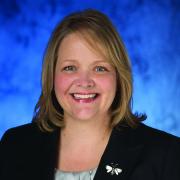A Letter to Every Adult Who Was Once A Child and Turned Out Fine

It can’t be that hard to mind the kids. Make sure they have lunch. Wipe their stuffy noses. A little paper and some crayons after nap time. No problem. After all, your nursery school teacher didn’t have a degree in early childhood education—and she was the best. Surely, supporting a baby’s development requires nothing more than compassion and common sense. Child care is already unaffordable. And parents certainly don’t have or need a degree in order to raise their own children. So, why, then, do politicians keep raising the educational requirements for the people who are providing care and education to our youngest children? And why does the National Association for the Education of Young Children (NAEYC) keep encouraging them to?
The answer is simple: the immutable science of early learning does not allow us to draw any other conclusion than the fact that young children need both loving adults and intentional learning strategies to give them the best possible starts to their lives. To suggest otherwise is to ignore an ever-growing mountain of scientific facts. The vital importance of brain development in the early years, the economic impact of early investment, and the critical role of positive adult interactions with young children are exhaustively documented, and they all point to the same conclusion: increasing professional competencies for those who steward our children’s early learning will absolutely change outcomes for future generations.
Neuroscience and behavioral science point to unparalleled cognitive, physical, and social-emotional growth in young children. These sciences have also shown us that our lifelong approaches to learning—things like initiative, curiosity, motivation, engagement, problem solving, and self-regulation—are at their height of development in the early years.
But building these foundations in children’s earliest years doesn’t happen by accident. Attending to a child’s development in child care and preschool requires knowledge, skills, and competencies from early childhood educators. A recent report from the National Academies of Medicine illuminates the many areas that an early childhood educator must understand and support in order to capitalize on the critical window of young children’s development, including the acquisition of oral language, a developmental progression in mathematics, cognitive flexibility and self-regulation, inhibitory control, the mechanics of short-term and working memory, and the facilitation of relationships with children and their families.
After all, because 45 percent of children under age 6 are growing up in families earning less than 200% of the federal poverty level, early childhood educators must know how to work with families to ensure children’s positive development in a way that mitigates the effects on learning of poverty, chronic stress, and adverse child health.
And when they are able to do all of this—when early childhood educators are skilled and supported—the positive individual and collective benefits that research has shown result from high-quality early childhood education begin to accrue. Children are more likely to be ready for school. Opportunity gaps can be closed. Long term impacts on children’s health and later employment begin to take shape.
This is why embracing the need for early childhood educators to have unique knowledge, skills, and competencies is not government overreach. It is government responsiveness. It is policy catching up to the demands of research, science, and the voting public.
What’s been less clear is how we get there. For too long, early childhood educators have not been able to collectively advance as a profession to the point where we can be diverse, effective educators and leaders working within a compensation and recognition system that supports our excellence. We have, instead, a dramatically underfunded system rife with high levels of turnover and low levels of education and pay. Important efforts to improve early childhood educator quality and compensation have been uneven, which has resulted in significant variation in preparation, practice expectations, and compensation across settings and states.
That’s why NAEYC and our national, state, and local partners have commenced the Power to the Profession(P2P) initiative, which is rooted in the voices and perspectives of early childhood educators themselves. P2P is a national collaboration to define the early childhood profession by building on guidelines, frameworks, and standards that currently operate across programs, organizations, and states to establish a shared framework of career pathways, knowledge, and competencies, qualifications, standards, and compensation that unifies the profession.
Because the truth is that we’re all tinkered out. We can’t fuss at the edges anymore. If we want to fully extend America’s promise of a world-class education to the next generation, our country must prioritize and implement a bold vision of family and values that is rooted in the early years, so that, someday soon, asking whether an early childhood educator needs a degree will be as arcane as asking if a nurse does.
Engage with us anytime at www.naeyc.org/profession. We’ll be listening.
Rhian Evans Allvin is the chief executive officer of NAEYC. She is responsible for guiding the strategic direction of the organization as well as overseeing daily operations. Before joining NAEYC, Evans Allvin was a guiding force in Arizona’s early childhood movement for more than 15 years, including serving as CEO of Arizona's First Things First.
